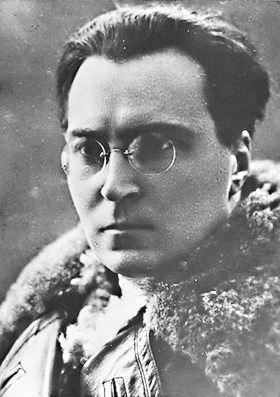Victor Serge facts for kids
Quick facts for kids
Victor Serge
|
|
|---|---|
 |
|
| Born | December 30, 1890 Brussels, Belgium
|
| Died | November 17, 1947 (aged 56) Mexico City, Mexico
|
| Nationality | |
| Political party |
|
| Spouse(s) | Liuba Russakova |
| Partner(s) | Laurette Séjourné |
| Children | 2, including Vlady |
| Signature | |
 |
|
Victor Serge (French: [viktɔʁ sɛʁʒ]; December 30, 1890 – November 17, 1947), born Victor Lvovich Kibalchich (Russian: Ви́ктор Льво́вич Киба́льчич), was a Russian writer, poet, Marxist revolutionary and historian. Originally an anarchist, he joined the Bolsheviks five months after arriving in Petrograd in January 1919 and later worked for the Comintern as a journalist, editor and translator. He was critical of the Stalinist regime and remained a revolutionary Marxist until his death. He was a close supporter of the Left Opposition and associate of Leon Trotsky.According to, William Giraldi, Serge's novels may be "read like an alloy of" George Orwell and Franz Kafka: "the uncommon political acuity of Orwell and the absurdist comedy of Kafka, a comedy with the damning squint of satire, except the satire is real." In his studies of Serge, Richard Greeman described him as a Modernist writer influenced by James Joyce, Andrei Bely and Freud; Greenman also believed that Serge, although writing in French, continued the experiments of such Russian Soviet writers as Isaac Babel, Osip Mandelstam and Boris Pilnyak and poets Vladimir Mayakovsky and Sergei Yesenin. He is remembered as the author of novels and other prose works, memoirs (e.g. Memoirs of a Revolutionary) and poetry. Among his novels chronicling the lives of Soviet people and revolutionaries and of the first half of the 20th century, the best-known is The Case of Comrade Tulayev (French: L'affaire Toulaev). Nicholas Lezard calls the novel " of the great 20th-century Russian novels" that follows the traditions of "Gogolian absurdity".
Contents
Early Life
Serge was born in Belgium to Russian revolutionaries in exile. He had little formal schooling and left home in his teens. He lived in a French mining village, worked as a typesetter, and went to Paris. While in Paris he became an anarchist and editor of one of the movement's newspapers.
During that time he was caught up in the trial of the Bonnot Gang with his then-wife Rirette Maîtrejean and others. Some of the accused were executed, the women were acquitted and Serge was sentenced to five years imprisonment for refusing to testify. He was 22 years old at the time of his sentencing and was released in 1917.
In 1919 he arrived in revolutionary Russia during the civil war between the Red (revolutionary) and White (counter-revolutionary) armies. While concerned that the Bolsheviks were repressing opposition to their left, he later wrote, "Even if there was only one chance in a hundred for the regeneration of the revolution and its workers' democracy, that chance had to be taken".
Works available in English
Fiction
- The Long Dusk (1946) Translator: Ralph Manheim; New York : The Dial Press. Translation of Les derniers temps, Montreal 1946.
- The Case of Comrade Tulayev (1967) Translator: Willard R. Trask; New York : New York Review of Books Classics. Translation of L'Affaire Toulaev. Paris 1949.
- Birth of our Power (1967) Translator: Richard Greeman; New York : Doubleday. Translation of Naissance de notre force, Paris 1931.
- Men in Prison (1969) Translator: Richard Greeman; Garden City, NY: Doubleday. Translation of Les hommes dans le prison, Paris 1930.
(revised edition of The Long Dusk)
Poems
- Resistance (1989) Translator: James Brooks; San Francisco: City Lights. Translation of Résistance, Paris 1938.
Non-fiction: books
- From Lenin to Stalin (1937) Translator: Ralph Manheim; New York: Pioneer Publishers. Translation of De Lénine à Staline, Paris 1937.
- Russia Twenty Years After (1937) Translator: Max Shachtman; New York: Pioneer Publishers. Translation of Destin d'une révolution, Paris 1937. Also published as Destiny of a Revolution.
- Memoirs of a Revolutionary, 1901–1941 (2012) Translator: Peter Sedgwick with George Paizis; New York: New York Review of Books Classics. Translation of Mémoires d'un révolutionnaire, 1901–1941, Paris 1951.
- Year One of the Russian Revolution (1972) Translator: Peter Sedgwick; London: Allen Lane. Translation of L'An 1 de la révolution russe, Paris 1930.
- The Life and Death of Leon Trotsky (1973) (with Natalia Sedova Trotsky) Translator: Arnold J. Pomerans; Garden City, NY: Doubleday. Translation of: Vie et mort de Leon Trotsky, Paris 1951.
- What Everyone Should Know About State Repression (1979) Translator: Judith White; London: New Park Publications. Translation of Les Coulisses d'une Sûreté générale. Ce que tout révolutionnaire devrait savoir sur la répression, Paris 1926.
Non-fiction: collections of essays and articles
- The Century of the Unexpected – Essays on Revolution and Counter-Revolution (1994) Editor: Al Richardson; special issue of Revolutionary History, Vol.5 No.3.
- The Serge-Trotsky Papers (1994) Editor: D.J. Cotterill; London: Pluto.
- Revolution in Danger – Writings from Russia 1919–1921 (1997) Translator: Ian Birchall; London: Redwords.
- The Ideas of Victor Serge: A Life as a Work of Art (1997), Edited by Susan Weissman, London: Merlin Press.
- Witness to the German Revolution (2000) Translator: Ian Birchall; London: Redwords.
- Collected Writings on Literature and Revolution (2004) Translator and editor: Al Richardson; London: Francis Boutle.
Non-fiction: pamphlet
- Kronstadt '21 (1975) Translator: not named; London: Solidarity.
Sources: British Library Catalogue and Catalog of the Library of Congress.
See also
 In Spanish: Víctor Serge para niños
In Spanish: Víctor Serge para niños
- Anarchism in France
- Anti-Stalinist left
- Transatlantic (portrayal in 2023 TV series)

